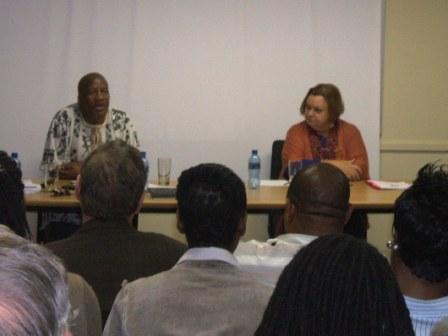
“Our policy speaks to the inequalities in South Africa. The reality is that black people are on the receiving end and they have always been. We need to do justice to their economic and social standing against the white population that has always been privileged,” said Mr Jackson Mthembu, national spokesperson of the African National Congress (ANC) at a recent debate to mark World Press Freedom Day (3 May 2012) at Rhodes University.
Debating whether South Africa’s media policy should be informed by a historical approach aimed at addressing past inequalities or a focus on embracing the possibilities presented by technology, the debate centred on the ANC and Democratic Alliance’s (DA) media and communications policies, and whether they address the twin challenges of media diversity and universality of communications in South Africa.
Providing an overview of the ANC’s mixed market, BEE informed media policy which retains a strong focus on South African history and providing historically disadvantaged groups with opportunities for media ownership, Mr Mthembu emphasised the need for government’s proposed media appeals tribunal and Protection of State Information Bill.
“It is unimaginable that 18 years after democracy the repressed still have no ownership and control of the media. Unfortunately we have been seen to be fighting the press. The self-regulating environment we’ve created is not in the public interest as it stands. There are many weaknesses,” he said, adding that “if there is a problem with self-regulation the people of South Africa should have recourse.”
Acknowledging the decline in South Arica’s ratings of press freedom, as noted by recent statistics released by Freedom House, Mr Mthembu said that South African news media “can’t be so free that you’re free of our constitution”, and that it has never been government’s wish to directly regulate the press.
“Where the press sees corruption they must speak without fear. We still maintain that press must be free from government and business, but it must have the capacity for research and certain codes must be enforced,” he said.
Calling for an overhaul of this approach and a loosening of regulatory framework, Mrs Marian Shinn, a former journalist, Member of Parliament for the DA and its shadow Minister of Communications outlined the DA’s communications policy. Mrs Shinn suggested that while an appreciation of South Africa’s history and the effects on previously disadvantaged groups has an important part to play in informing effective policy, the ANC should embrace the possibilities afforded by technology.
“Technology is presenting South Africa’s media landscape with a plethora of opportunities. We need to use new technology to our advantage. Let’s take the opportunities that technology offers us. Government knows what to do,” she said, calling for increased bandwidth access which will allow greater communication potential in rural areas.
“Let’s use technology to break up old power blocs and monopolies of the past,” she said, referring to the DA’s proposed dissolution of the SABC. “Let’s create our own multi-diverse media industry. Policy is about shaping the future, not scab-picking the past,” she said.
The seminar was hosted by the School of Journalism and Media Studies and prominent media activist and Professor in the Chair of Media and Information Society, Highway Africa, Jane Duncan. It was the concluding session for the 2012 Masters Media Policy and Institutions course.
By Sarah-Jane Bradfield
